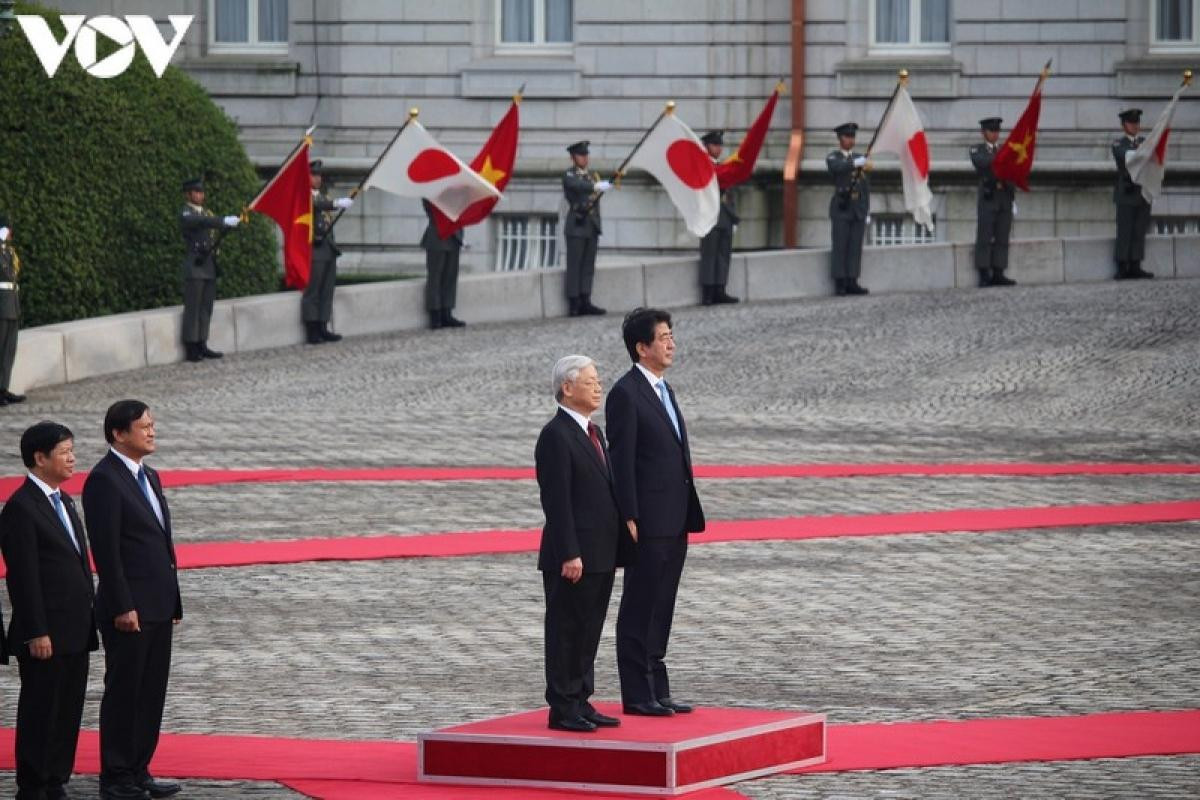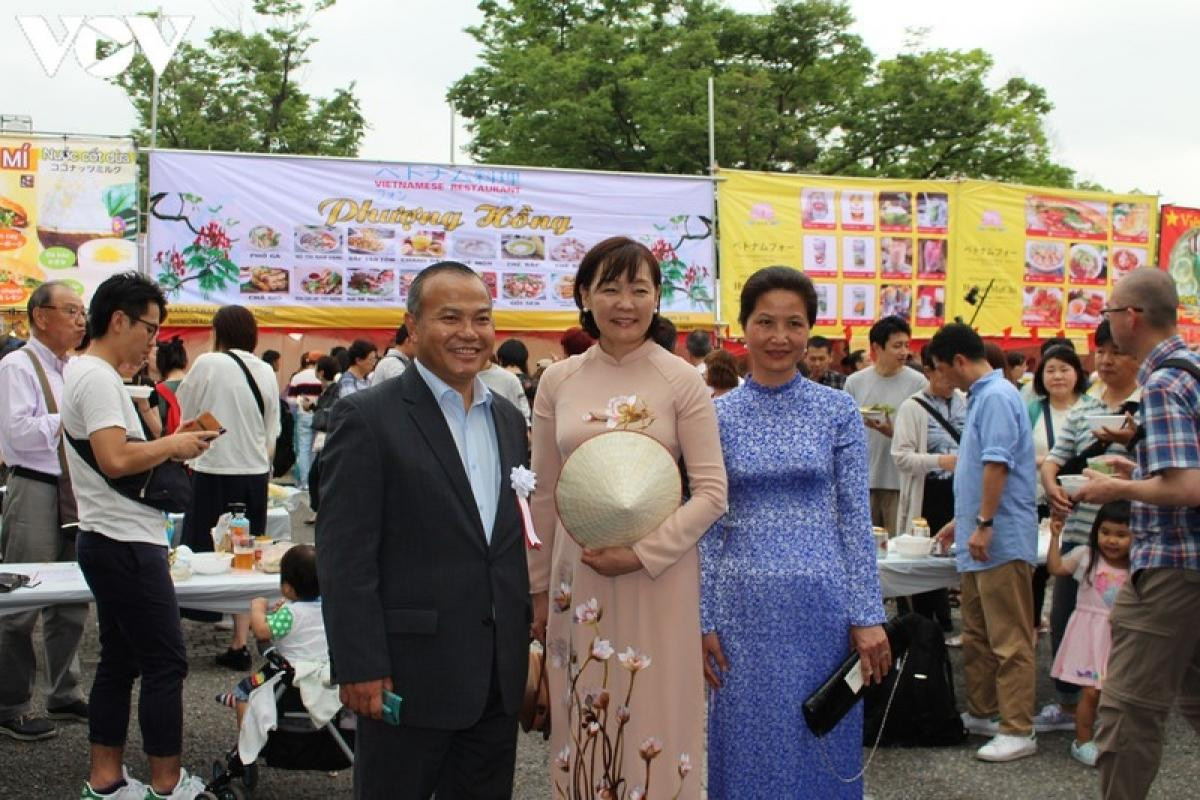Abe Shinzo - the Prime Minister who loves Vietnam from the bottom of his heart
For Vietnam, the death of former Japanese Prime Minister Shinzo Abe is a great loss.
Former Japanese Prime Minister Abe Shinzo passed away after being shot this afternoon in Nara Prefecture while campaigning for the Upper House election. This news has shocked the world. The Japanese people are shocked. As for Vietnam, the fact that a close friend, a respected world leader, has made efforts to contribute to the unprecedented development of Vietnam-Japan relations and the development of Vietnam is no longer a great loss.
Abe Shinzo - a prestigious name
Mr. Abe Shinzo is 67 years old, born in Tokyo. His maternal grandfather, Kishi Nobusuke, is also the Japanese Prime Minister who reformed the Japan-US Security Treaty. Mr. Abe's father previously held many important positions such as Secretary General of the LDP and Foreign Minister. Thus, Mr. Abe Shizo's family is a family of politicians.
 |
Prime Minister Abe Shinzo at the welcoming ceremony for the General Secretary's visit to Japan in September 2015. |
Mr. Abe Shinzo graduated from Keisei University and studied in the United States. He also worked as a secretary for his father when he was Japan's Foreign Minister.
He had a political mindset from an early age when he held important positions in the LDP at a young age, such as Director of the Youth Bureau, Chairman of the Social Security Association, and then Chief of the Cabinet Office of Prime Minister Koizumi's administration.
He was also the one who visited North Korea and witnessed the talks between Prime Minister Koizumi and Leader Kim Il Sung. Therefore, he later made efforts to resolve the issue of abducted Japanese hostages.
Inheriting the thinking of the Koizumi administration, Mr. Abe became Japan's youngest post-war Prime Minister in 2006 when he first ran for Prime Minister.
During his term in office, he contributed to the establishment of the Education Reform Law, the People's Election Law and the construction of the Constitutional reform procedure.
During the period from 2012 to 2020, as Japan's longest-serving Prime Minister, Mr. Abe Shinzo prioritized focusing on restoring the Japanese economy to reduce inflation, implementing the Abenomics policy with three pillars: promoting growth through increasing private investment, transparency and promoting sustainable monetary and financial policies.
In the field of diplomacy, he has always been proactive and active in enhancing exchanges. He has visited 176 countries and territories, successfully organized the G7 Summit in Japan in 2016, and the G20 in Osaka in 2019. Later, Mr. Abe Shinzo himself persuaded President Obama to directly visit Hiroshima and the memorial site for victims of the US atomic bomb. He himself was the first incumbent Prime Minister of Japan to visit Pearl Harbor and pay his respects to the martyrs who died in this battle. This has opened up a more open mind when perceiving the past.
In the field of economic diplomacy, Mr. Abe Shinzo has made a strong personal mark by promoting the participation of 11 countries in the Trans-Pacific Partnership Agreement (TPP) despite the US withdrawing from participation.
He was also active in pursuing reform of the Japanese Constitution to suit the new situation, including allowing the Japanese military to participate overseas. This determination was continued by successive Prime Ministers.
He is also the Prime Minister who has won 6 consecutive bicameral elections, considered the strongest government in the years 2017-2019.
 |
Prime Minister Abe Shinzo's wife (center) wears Vietnamese ao dai when attending the Vietnam Festival in Japan. |
The Prime Minister loves Vietnam from the bottom of his heart
It can be said that from 2015 to now, Vietnam-Japan relations are at an unprecedentedly good stage, developing in all aspects with substantial results. That is thanks to the joint efforts of the people, generations of leaders of the two countries, especially Prime Minister Abe Shinzo.
Prime Minister Abe Shinzo has special feelings for Vietnam. Therefore, he is willing to receive Vietnamese leaders and Vietnamese people in any circumstances if possible. In addition to the highest diplomatic protocol for senior leaders, Mr. Abe is willing to receive lower-level leaders to share cooperation plans that are most beneficial for both sides.
In September 2015, General Secretary Nguyen Phu Trong officially visited Japan. During this visit, the highest-level welcoming ceremony was held at the Japanese Prime Minister's Office. During the meeting with General Secretary Nguyen Phu Trong, Japanese Prime Minister Abe said: "I am extremely pleased to welcome the visit to Japan of General Secretary Nguyen Phu Trong - the highest leader of Vietnam, a close friend visiting Japan. I highly value the relationship with Vietnam. I chose Vietnam as the first country to visit after being re-elected as Prime Minister. I am pleased to see the Vietnam - Japan relationship developing in many fields, in the spirit of strategic partnership".
Furthermore, Prime Minister Abe and General Secretary Nguyen Phu Trong discussed and shared their deep concerns about the actions that continuously change the status quo and cause tension in the East Sea, such as land reclamation and large-scale base construction. At the same time, they agreed to adopt a joint statement on the direction of cooperation in the coming time by implementing specific projects, demonstrating the deep and extensive development of the bilateral cooperation relationship.
In international forums and relevant conferences, wherever they are held, Prime Minister Abe always meets with Vietnamese leaders if possible. Prime Minister Abe's invitation to Vietnam to participate in the G7 Summit held in Japan in May 2016, and the G20 held in Osaka at the end of June 2019 is an affirmation that the Prime Minister always attaches importance to strengthening cooperative relations with Vietnam. Prime Minister Nguyen Xuan Phuc attended both of these major conferences.
During the talks between the two sides on the occasion of these two major events, Prime Minister Abe Shinzo affirmed that Japan considers Vietnam an important partner, highly appreciating the significance of Prime Minister Nguyen Xuan Phuc's working visit to Japan and attendance at the Summit. Japanese Prime Minister Abe highly appreciated Vietnam's position, role and foreign affairs achievements, and also appreciated the Vietnamese community in Japan, considering it a "valuable common asset" for the relationship between the two countries.
Not only do Vietnamese leaders regularly visit Japan and hold talks with Prime Minister Abe Shinzo, but during his tenure as Prime Minister, Mr. Abe visited Vietnam four times, starting in November 2006 when he attended the APEC Summit and making an official visit to Vietnam in January 2013 when he took office as Prime Minister for the second time. This visit was his first foreign visit after taking office as Prime Minister. The two other visits were in January 2017 and November 2017. All of these visits left special impressions in the hearts of the Vietnamese people, demonstrating the deep and extensive strategic partnership between the two countries, in which Prime Minister Abe's role was particularly prominent.
Making a historical mark for Vietnam-Japan relations
As the longest-serving Prime Minister of Japan to date, Prime Minister Abe Shinzo has taken concrete actions, in addition to promoting ODA aid to Vietnam, enhancing investment cooperation between the two countries, and also paying attention to enhancing cultural exchanges and educational cooperation. During the period when Mr. Abe Shinzo was Prime Minister of Japan, he actively increased ODA (aid, preferential loans...) for Vietnam. In the period 2010 - 2020, there were five years when capital from Japan reached 7 billion USD/year for Vietnam. This capital contributed greatly to Vietnam's development.
In 2019, on the sidelines of the G20 summit in Japan, Mr. Shinzo Abe cleverly arranged and facilitated a quick meeting between Prime Minister Nguyen Xuan Phuc and US President Donald Trump. That meeting partly resolved the trade fraud allegations against Vietnam.
In the field of trade, Japan has always been one of Vietnam's most important trade partners for many years. In 2019, Japan was the 4th largest trade partner (after China, the United States, and South Korea), the 3rd largest export partner (after the United States and China), and the 3rd largest import partner (after China and South Korea) of Vietnam.
Bilateral import-export turnover in the past 10 years has grown quite steadily. In general, the Vietnam-Japan trade balance in the past 10 years has been relatively balanced, with the annual difference between exports and imports not being too large. In terms of investment, in 2019, Japan ranked 4th among countries and territories with investment projects in Vietnam, with a total registered capital of 4.14 billion USD.
In the fields of culture and education, cooperation has made remarkable progress as the number of international students and interns has increased many times in recent years. Moreover, in the context of the Covid-19 pandemic spreading in many countries, including Vietnam and Japan, Japan still has support policies for Vietnamese international students and interns such as visa extensions, living support, medical examination and treatment support during the pandemic, etc., creating favorable conditions for all Vietnamese people living abroad.
Former Prime Minister Abe Shinzo has passed away, but his feelings for Vietnam, his work for Vietnam, and his contributions to the Vietnam-Japan relationship will forever be historical marks of a man dedicated to a nation./.

